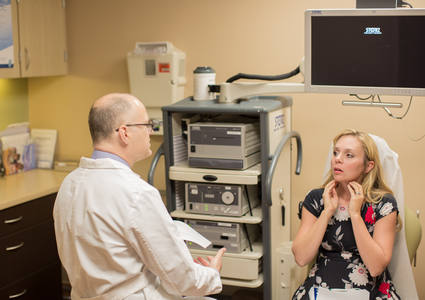Cancer Care
Treating Thyroid Cancer
Published: Jan. 8, 2020When thyroid cancer is a possibility, the best place to start is with a good diagnosis. As both a surgical oncologist specializing in thyroid cancer and a survivor of the disease, I know how important it is to have clear answers for patients and their families.
Read more: What is Thyroid Cancer?
Affecting nearly 54,000 Americans each year, thyroid cancer is one of the fastest growing incidences of cancer in the nation. It’s also one of the most commonly treated cancers at the Methodist Head and Neck Surgical Oncology Clinic.
It Starts With Assessment
Typically, an assessment of a thyroid lump begins with an ultrasound. Some lumps look very benign – which is good. Others look a bit more worrisome while some look diagnostic of cancer. The ultrasound helps us decide whether the nodule is something we can safely follow without taking the next step.
An ultrasound may be followed up with a biopsy. In a biopsy, we use a fine needle to gather a small tissue sample from the growth. This tissue is then analyzed by pathologists to see whether the tumor is benign or malignant.
Making Decisions About Treatment
 After receiving the biopsy results, the physician and patient work together to determine the best course of action. It may come down to how the patient assesses risk and the extent of the operation that may be needed.
After receiving the biopsy results, the physician and patient work together to determine the best course of action. It may come down to how the patient assesses risk and the extent of the operation that may be needed.
I believe it’s very important for physicians to tell patients what they would do if the tables were turned – if they were the patient, or if the patient were their mother or brother. It allows individuals to weigh the pros and cons of any given treatment choice.
What Are the Options for Treating Thyroid Cancer?
In almost all cases, thyroid cancer is treated surgically.
If the growth is small, you may have the option to remove just half of the thyroid. Others may choose to have the entire thyroid removed to ease future worries. There are pros and cons of a partial thyroid lobectomy and a total lobectomy.
The final decision may come down to the patient’s anatomy, the configuration and size of the nodule, whether any lymph nodes are involved, and the patient’s own assessment of risk.
Expert Care and Treatment
As a thyroid cancer survivor, I understand the worries that come with diagnosis and treatment. That’s why I am honored to be surrounded by my colleagues at the Methodist Head and Neck Surgical Oncology Clinic. It is one of the largest in the country and is the largest in the region dedicated solely to the care of patients with head and neck cancer.
For expert care from our specialized multidisciplinary team, contact our office for an assessment or speak with your Methodist Physicians Clinic primary care provider.


